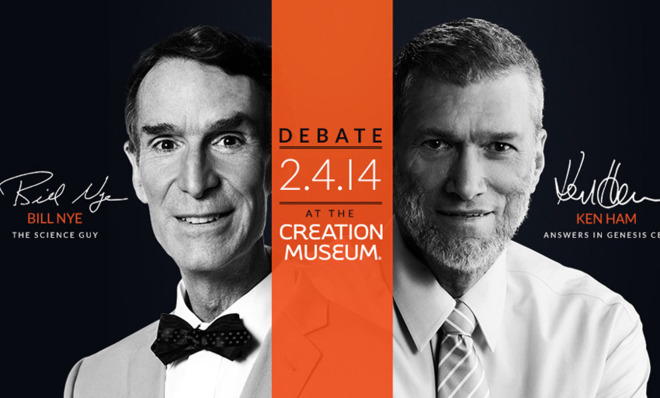Bill Nye vs. Ken Ham, and Christianity's misunderstood relationship with science
Thanks to so-called literalists like Ham, much of the secular world thinks there are irreconcilable differences between Christianity and science. There aren't.

A free daily email with the biggest news stories of the day – and the best features from TheWeek.com
You are now subscribed
Your newsletter sign-up was successful
Tonight, Bill Nye of PBS' Bill Nye the Science Guy fame will debate arch-creationist Ken Ham as to whether creationism is a viable model for understanding the origins of life on earth. Nye will argue for evolution and a secular scientific understanding of the origins of life, while Ham will undoubtedly promote marginal and cagey scientific 'data' in order to further his Young Earth creationist theory.
The debate is a powerful representation of what many seem to perceive to be true about Christianity and science: That the two appear at odds in culture, with opposing goals and mutually exclusive interests. It is not only that they seem to have nothing to inform each other of, but that they're presented as opponents vying for a place in the lives of the public that can only be occupied by one or the other. This is perhaps the reason that some secular publications have bemoaned the fact that the debate is even taking place; as Hermant Mehta points out with reference to notorious atheist Richard Dawkins, debates like these seem a poor choice for the secular community as they suggest that there is even a debate on the truthfulness of evolution.
Of course, Ham is not without his Christian detractors, many of whom object to his mission to remove the teaching of evolution from public schools. Ham's hardline position on Biblical literalism even got him disinvited from multiple homeschooling conventions populated by other young earth creationists, which is as much a testament to his ego as it is to the difficulty of establishing what, exactly, a literal interpretation of the Bible really looks like — though Ham would have you think that's obvious.
The Week
Escape your echo chamber. Get the facts behind the news, plus analysis from multiple perspectives.

Sign up for The Week's Free Newsletters
From our morning news briefing to a weekly Good News Newsletter, get the best of The Week delivered directly to your inbox.
From our morning news briefing to a weekly Good News Newsletter, get the best of The Week delivered directly to your inbox.
But disagreements persist, and Christians who object to Ham's mission are right to pursue those interpretive and spiritual disagreements. While Ham's evidently staunch Biblical literalism is presented to the public as the simplest and most honest understanding of scripture, it is in reality as idiosyncratic and rife with interpretive work as any other reading. And for Christians who are concerned with Ham's behavior, this should perhaps be the most distressing reality. Because it is not just the case that Ham intends to use Christianity to shape how policy looks, but also that he intends to use policy to shape how Christianity itself looks.
In short, Ham wants to enshrine in law the idea that evolution conflicts irreconcilably with Christianity, a position based upon his understanding of how Genesis must be interpreted. If Ham and his young earth creationist ilk have their way and schools are legally prohibited from broaching the topic of evolution with children, it will be a permanent testament to the legitimacy of his Biblical hermeneutics, as well as the claims he concludes from them, namely that the creation story presents a full-stop rebuttal to the theory of evolution. Children who would grow up in Ham's ideal world would do so knowing not only that evolution wasn't taught to them, but that it wasn't because Christianity proclaims it cannot be, based Ham's particular literal reading of Genesis.
In other words, Ham could declare by legal fiat what the right way to read the Bible is, and what we must conclude from that right reading. Moreover, Ham's claim that evolution teaches children that "they're just animals, there's no God" makes an extraordinary supposition about faith: Namely that it is brittle enough that the mere clash of his Biblical reading with natural science could destroy it. Are any of these notions of faith ones Christians should be comfortable weaving into the fabric of our laws?
It seems numerous Christian organizations don't think so. The Catholic Church, for example, maintains that the theory of evolution is compatible with a religious worldview — Cardinal Gianfranco Ravasi, the head of Ponfitical Council for Culture, even sees similarities between Darwin and St Augustine and St Thomas Aquinas. The teaching of evolution in Roman Catholic schools has been commonplace for sometime, consistent with the Church's interest in truth and reason. The Church of England, too, maintains that evolution is wholly compatible with a faithful view of the world. The United Methodist Church does not find any conflict between evolution and theology, and opposes the attempt to inject young earth creationism into school curricula. And this cross section of denominations and churches is only a small sample: Numerous other Protestant congregations follow in roughly the same vein.
A free daily email with the biggest news stories of the day – and the best features from TheWeek.com
Sean McElwee and Abigail Salvatore recently noted in a Salon essay that it is unwise for secularists to challenge Christians like Ken Ham on the grounds of religion, since the stakes at hand are really political. This is true, and handling the political outcomes of Ham's legislative evangelism is an appropriate course for secularists who oppose him. But for faithful Christians who oppose his project, it is paramount that we recognize his aim is to legally declare what real Christianity is, and in doing so render marginal by law all other traditions — many of which are far older, richer, and better established than his own. Christians must resist him vocally, for the safety of our politics and our religion.